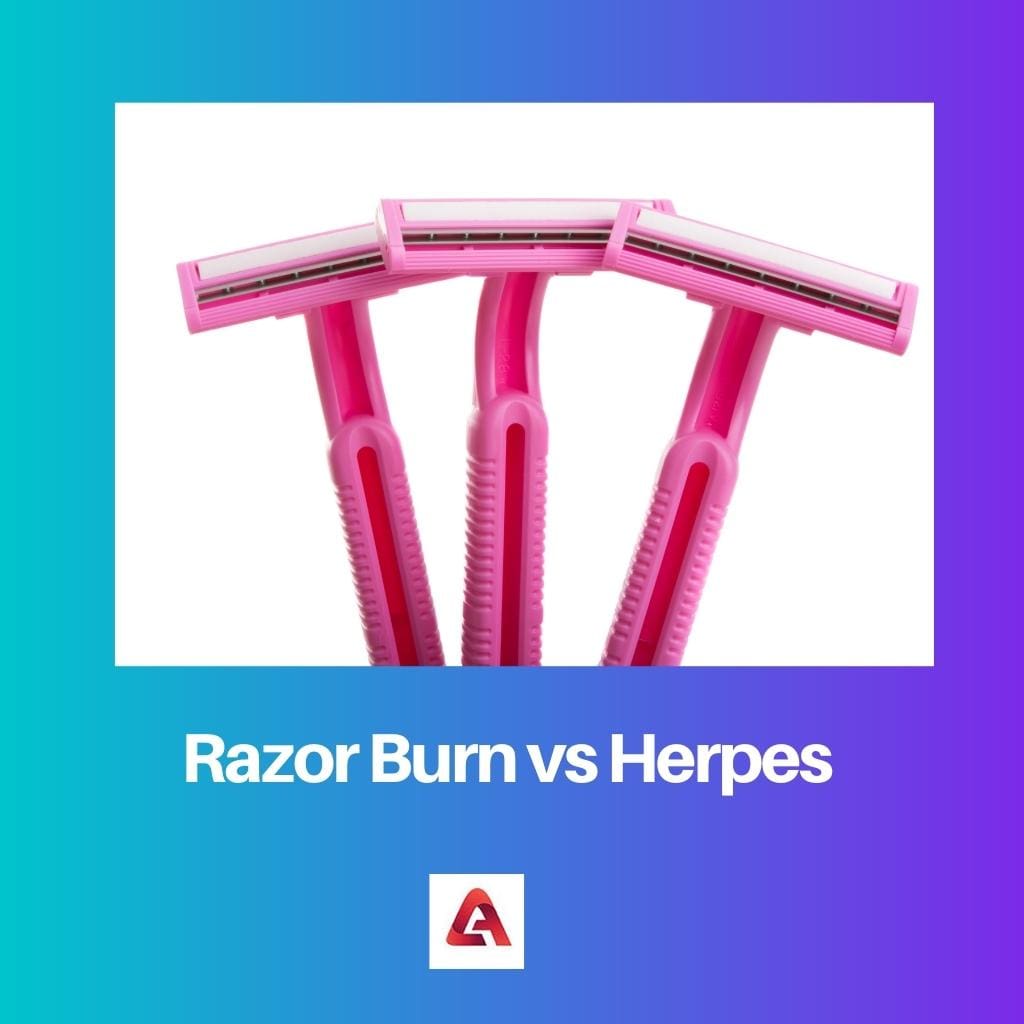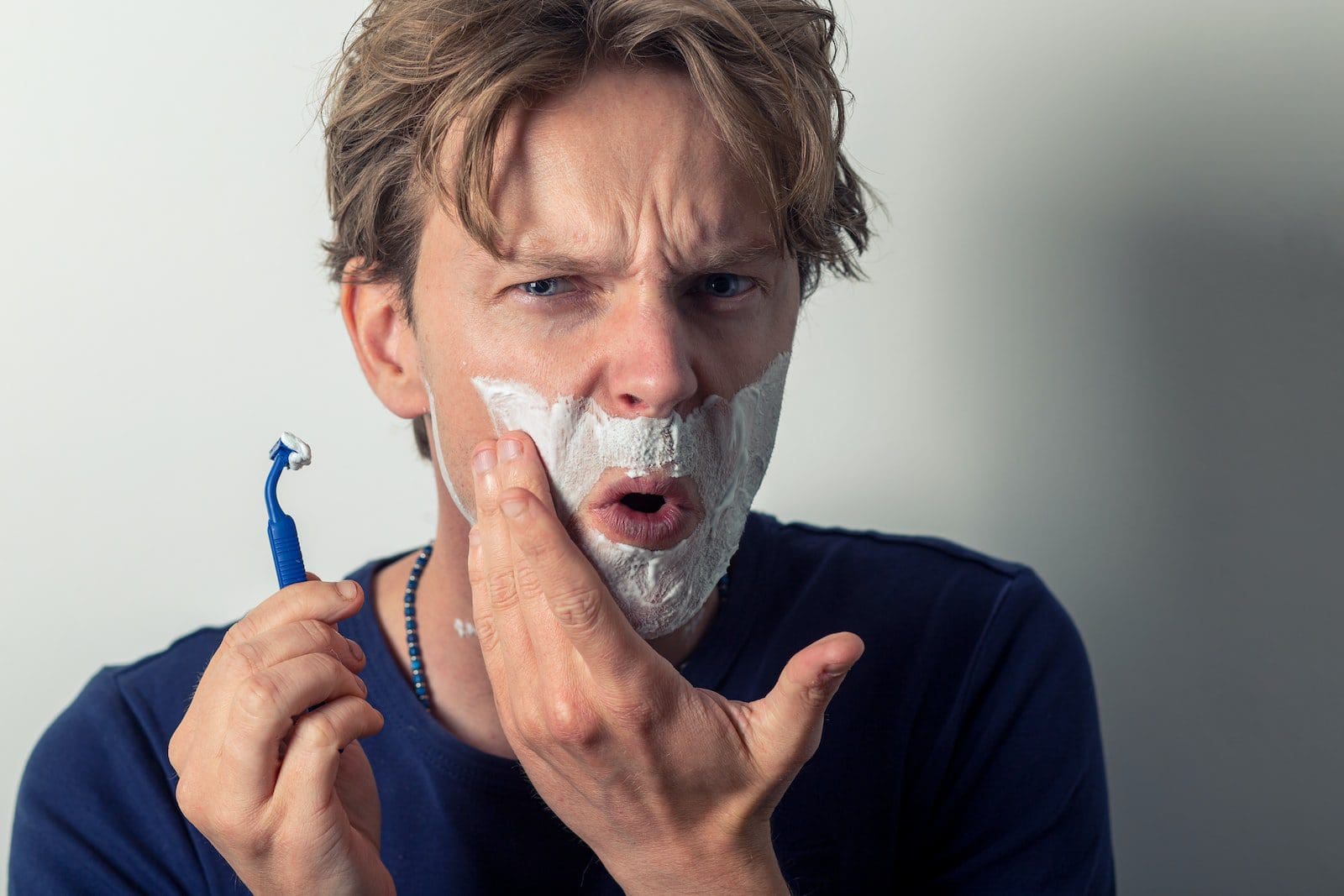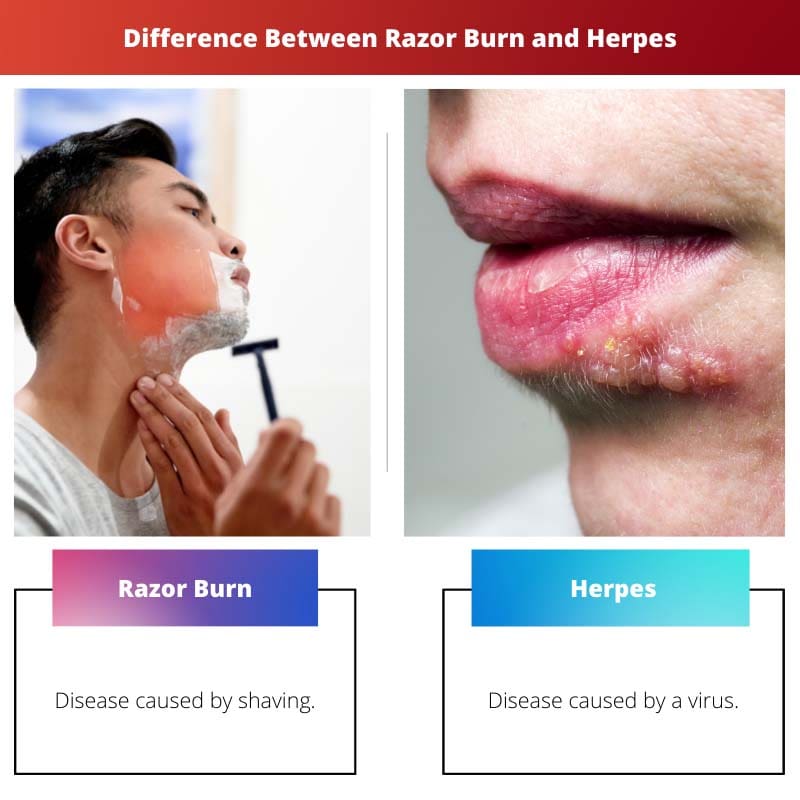Skin is a very soft and large organ of the human body. It is very sensitive and acts as a protective barrier. It saves the body from all the external factors which can cause any harm to the body.
Therefore it is important to understand the various skin viral infections to cure or prevent them from happening, such as shingles, chickenpox, and many more.
Among these are the Razor Burn and Herpes. Both of them cause itching and are very uncomfortable on the skin. Mostly they are mistaken as the same. This is not correct, therefore to treat them, it is essential to know the difference between both of them.
Key Takeaways
- Razor burn is a skin irritation caused by shaving, while herpes is a viral infection that causes sores on the skin.
- Razor burn is a temporary condition that can be treated with over-the-counter remedies, while herpes is a chronic condition that requires medical treatment.
- Razor burn is not contagious, while herpes is a sexually transmitted infection that can be passed from person to person.
Razor Burn vs Herpes
Shaving can cause irritation on the skin, which is called razor burn. A person can avoid a razor burn by shaving properly. A razor burn cannot be harmful. Herpes Simplex Virus (HSV) can cause a disease called herpes. Herpes needs to be treated medically. Herpes can be dangerous. This virus can infect any part of the body.

Razor Burns is infections or rashes caused by the harsh razor blades on the skin (inflation of the hair follicles). It occurs in the area where shaving is done, i.e. legs, face, arms, pubic areas, etc.
It is not very dangerous unless in some cases (pseudofolliculitis barbae ensues). It can be treated at home, no need to rush to the doctor.
Herpes is a virus infection caused by the HSV (herpes simplex virus) on the skin. It is not bounded to any particular part of the body and can occur at various parts of the body. It is a very common viral infection that can be transmitted from one infected person to another with physical touch.
Comparison Table
| Parameters of Comparison | Razor Burn | Herpes |
|---|---|---|
| Meaning | Disease caused by shaving | Disease caused by a virus |
| Cause | Shaving | Herpes simplex virus |
| Where it occurs | Shaved surface | Any area of skin |
| Symptoms | Redness and itching | Tenderness and burning |
| Treatment | Corticosteroids | Antiviral |
What is Razor Burn?
A person shaving a lot can experience razor burn (skin infection caused by razor blades). Razor burn is responsible for:
- A burning sensation in the infected area.
- Irritation.
- Redness on the infected area.
- Tinny red bumps or rashes.
All the above are the symptoms of razor burn, which can be treated by using the following:
- Applying something cool on the surface, such as ice, aloe vera gel, or a cold, wet cloth.
- An individual should immediately wash the area and dry it (very gently, not rubbing) and apply any moisturizer or antiseptic that does not contain alcohol (it can lead to more irritation). This will help relieve irritation.
- Apple cider vinegar, tea tree oil mixed with water, etc., can be used to decrease or reduce inflammation.
Preventive measures:
- Removal of dead skin: this can be done with regular exploitation of the skin.
- Using soap: soap, shaving cream, or shampoo should be used before shaving the area.
- Always shave in the direction of hair growth.
- Always keep the razor blade clean.
- Don’t shave very hard or fast.
Causes:
- Shaving without applying soap or any lubricant.
- Ignoring the hair growth direction and shaving the opposite of it.
- Using the same razor for a longer period.
- Shaving harshly and quickly.

What is Herpes?
This is the cause of the Herpes simplex virus, which is of two types:
- HSV-1: it causes oral herpes that infects the mouth or surrounding areas.
- HSV-2: it causes genital herpes that is sexually transmitted.
Symptoms:
- Tingling sensation on the infected area.
- Itching or burning.
- Redness on the infected area.
- Fever.
- Fatigue or not feeling healthy.
Causes:
- Through the infected person
- By having unprotected intercourse.
Treatment:
Treatment of herpes can be done at home by using the following:
- Cornstarch or aloe vera gel on the affected area.
- Taking medicines such as acetaminophen or ibuprofen.
- Taking a bath with salted water.
- Using petroleum jelly on the affected area.
- Wearing baggy clothes.
- Avoid sexual activity completely (with or without protection).
- Applying any lidocaine-containing lotion or moisturizer.
Preventive Measures:
- Having protective intercourse always.
- Avoiding any sexual activity with the infected person.
- Washing and cleaning any part after being in contact with an infected person.
It is considered that no medication can directly lead to the termination of herpes but obviously can help with the irritation or other uncomfortable symptoms. It also increases the risk of HIV in the infected person.

Main Differences Between Razor Burn and Herpes
- Razor Burns is an infection caused by shaving when blades of the razor are used on dry skin, whereas herpes is an infection caused by the virus, i.e. Herpes Simplex Virus (HSV).
- Razor Burns only occur on the shaved surface, but Herpes can occur in several body parts, and it has nothing to do with shaving.
- Symptoms of Razor Burns are Redness and itching, and Symptoms of Herpes are Tenderness and burning.
- Razor Burn can be treated easily by using any antiseptic cream or Corticosteroids, and Herpes cannot be treated with medication, although symptoms can be cured.
- Herpes can also be transmitted through mucosal secretion and direct contact with an infected person, whereas Razor Burns is not transmitted with any physical contact with the infected person.

- https://www.sciencedirect.com/science/article/pii/S0140673607619084
- https://www.sciencedirect.com/science/article/pii/S0140673600046389
- https://www.jstor.org/stable/4481417
The in-depth information provided on the causes and treatments will help individuals identify and address these skin infections appropriately.
Yes, this article offers a comprehensive understanding of these conditions and necessary actions.
I agree, this knowledge empowers individuals to take proactive steps towards better skin health.
It is enlightening to understand the symptoms of both skin infections and the potential treatments.
Absolutely! This knowledge allows personal management of these conditions.
Yes, understanding the symptoms is crucial to prompt treatment.
I found very interesting the information about the symptoms and treatments of Razor Burn and Herpes. It is important to know when it is necessary to see a doctor.
Agreed. It’s essential to seek professional assistance when dealing with skin-related infections.
Yes, this is crucial to stop the spread of contagious infections and improve preventative measures.
The preventive measures and causes detailed for both conditions will be immensely beneficial for readers.
Absolutely! It is important to make informed choices regarding our health and well-being.
The comparison table provided a very clear and concise overview of the differences between Razor Burn and Herpes.
Absolutely, the table greatly simplifies the understanding of these conditions.
Understanding the causes of these skin infections is a critical first step in treatment and prevention.
I appreciate the detailed overview of both conditions and their symptoms, it’s very helpful.
Yes, it’s commendable to see such comprehensive information provided.
The advice on both preventive measures and causes is very insightful and helpful.
Yes, the more information we have, the better equipped we are to manage these issues.
I agree, it gives a more thorough understanding.
The distinction between Razor Burn and Herpes is elaborated thoroughly in this article. A very informative read.
Thank you for outlining the preventive measures, this is an important aspect overlooked.
Absolutely! Understanding prevention is vital for managing these infections.